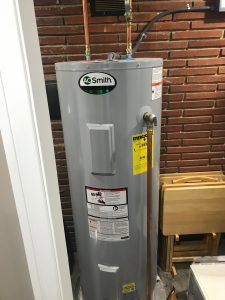The article following next relating to Water Heater Repair and Troubleshooting is indeed entertaining. You should take a look.

Envision starting your day without your routine warm shower. That already establishes a bad tone for the rest of your day.
Every house needs a dependable water heater, yet only a few understand just how to manage one. One very easy means to maintain your hot water heater in top form is to look for faults regularly as well as repair them as soon as they appear.
Keep in mind to switch off your hot water heater before smelling around for mistakes. These are the water heater mistakes you are most likely to come across.
Water too warm or as well cold
Every water heater has a thermostat that identifies exactly how hot the water obtains. If the water coming into your residence is also warm despite setting a hassle-free maximum temperature level, your thermostat might be malfunctioning.
On the other hand, too cold water might be because of a fallen short thermostat, a broken circuit, or inappropriate gas flow. For example, if you use a gas hot water heater with a damaged pilot burner, you would get cold water, even if the thermostat is in best problem. For electrical heaters, a blown fuse may be the perpetrator.
Warm water
Despite just how high you set the thermostat, you will not obtain any type of warm water out of a heating system well past its prime. A water heater's effectiveness might minimize with time.
You will certainly also get lukewarm water if your pipes have a cross link. This indicates that when you activate a tap, warm water from the heating system flows in along with regular, cold water. A cross link is simple to area. If your warm water faucets still run after closing the water heater shutoffs, you have a cross connection.
Unusual noises
There go to least 5 type of sounds you can speak with a hot water heater, but the most typical analysis is that it's time for the hot water heater to retire.
First of all, you should know with the normal appears a hot water heater makes. An electrical heater might sound various from a gas-powered one.
Standing out or banging noises normally indicate there is a piece of debris in your tanks, as well as it's time to cleanse it out. On the other hand, whistling or hissing sounds may simply be your valves letting some stress off.
Water leakages
Leakages can come from pipes, water links, valves, or in the worst-case situation, the container itself. With time, water will corrode the storage tank, and also find its way out. If this takes place, you require to change your hot water heater as soon as possible.
However, before your change your entire container, make certain that all pipes remain in place which each shutoff works flawlessly. If you still need help recognizing a leak, call your plumber.
Rust-colored water
Rust-colored water means one of your hot water heater parts is rusted. It could be the anode pole, or the storage tank itself. Your plumber will certainly be able to identify which it is.
Insufficient warm water
Water heaters can be found in lots of sizes, depending on your warm water demands. If you run out of warm water before everyone has actually had a bath, your hot water heater is too tiny for your family size. You need to think about installing a larger water heater tank or opting for a tankless water heater, which occupies much less space as well as is more resilient.
Discoloured Water
Rust is a significant root cause of filthy or discoloured water. Rust within the water container or a failing anode pole can trigger this discolouration. The anode pole secures the container from rusting on the within and should be checked annual. Without a rod or an effectively operating anode pole, the warm water promptly rusts inside the tank. Get in touch with a professional hot water heater specialist to establish if changing the anode rod will certainly take care of the problem; otherwise, replace your water heater.
Verdict
Preferably, your water heater can last 10 years before you require a change. Nevertheless, after the 10-year mark, you may experience any one of these mistakes more routinely. At this point, you must add a brand-new hot water heater to your budget.
How To Troubleshoot 3 Common Water Heater Problems in Twin Cities
The Water Heater Is Leaking
- A leaky cold water inlet valve
- A loose pipe fitting
- A leaky temperature and pressure relief valve
- A corroded anode rod
- A cracked tank
Turn Off Your Water Heater:
- Shut off your gas water heater by turning the gas valve on the unit to the “OFF” position.
- Shut off your electric water by switching its power off at your electrical panel. Look for a two-pole breaker labeled “water heater” and turn it to the “OFF” position. Move the ball valve connected to the water heater to be perpendicular to the piping at a 90° angle.
Look for the Leak:
Depending on whether the water is coming from the tank's top or bottom, you’ll want to look for the leak in different locations.
If the leak comes from the top of the tank, carefully look for water escaping from the cold water inlet valve or loose pipe fittings. Rusted hot and cold water valves can have loose connections with the tank, with water leaking out of them.
https://mspplumbingheatingair.com/blog/how-to-troubleshoot-3-common-water-heater-problems
Do you really like reading up on Water Heaters Problems? Put feedback down below. We would be pleased to find out your responses about this piece. In hopes to see you back again before long. Sharing is good. You just don't know, you might be doing someone a favor. Thanks for your time. Come back soon.
Today's problem, today's fix!
Comments on “Comprehending Water Heater's Malfunctions”